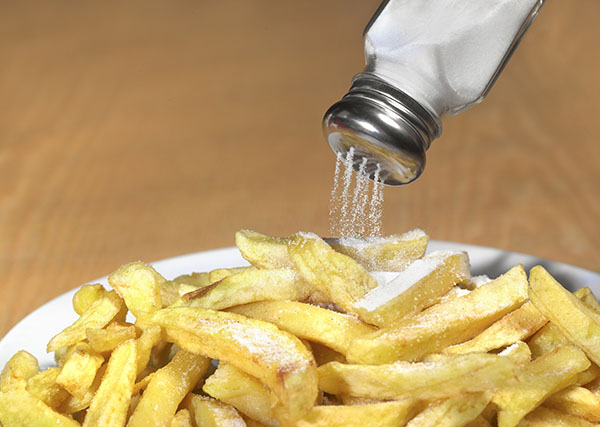Three things that could happen if you eat too much salt
June 7, 2022Categories: Blog Posts
Tags: Nutrition
 Sodium is an important element that helps regulate fluid levels in the body. And while it is possible to not get enough salt in your diet, most people consume way more than they need.
Sodium is an important element that helps regulate fluid levels in the body. And while it is possible to not get enough salt in your diet, most people consume way more than they need.
According to the Centers for Disease Control and Prevention, Americans consume on average greater than 3,400 mg of sodium per day, which is nearly 150 percent of the recommended limit.
Here are three things that could happen if you eat too much sodium daily:
High Blood Pressure
Too much sodium causes the body to hold onto water to balance it out, leading to increased blood volume and pressure on the circulatory system.
Having high blood pressure is a major risk factor for cardiovascular disease, so reducing your sodium intake can help lower your risk of heart disease that can potentially lead to heart attacks and strokes.
Since high blood pressure can be a “silent” condition without many symptoms, it’s important to get your annual check-up with a primary care physician and get the preventative screenings that are right for your age and gender.
Gaining Weight
A lot of sodium comes from processed and prepared foods like soups, canned vegetables, rice and pasta mixes, frozen dinners, instant cereal, instant pudding and gravy mixes. These foods can also contain plenty of other unhealthy ingredients such as added sugars and carbohydrates.
If you start eating fresher ingredients such as fruits and vegetables, you’ll likely also start eating more fiber and fewer of these added sugars and carbohydrates. This shift can promote a reduction in calories with an increased feeling of fullness that can lead to weight loss.
Increased Risk of Dehydration
If you eat a high-sodium diet without increasing your fluid intake, your body is forced to pull water from other cells. This can increase your risk of being dehydrated.
Because water is a key ingredient to important bodily functions, including joint lubrication, organ and tissue protection, and nutrient absorption, your body may not perform as well if you’re not properly hydrated.
If you’re concerned about how much sodium you eat, your first step is to talk with your primary care physician during your annual check-up. They can advise if your blood pressure and weight are within the recommended levels and provide insights on steps you can take to lower the amount of sodium you eat.
Vijay Choudhry, MD, is an internal medicine physician at Mercy Medical Associates at Eastwick. Schedule a primary care appointment online or by calling 215.863.6110.
